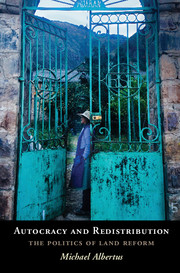Book contents
- Frontmatter
- Contents
- List of Tables
- List of Figures
- Acknowledgments
- 1 Introduction
- 2 Actors, Interests, and the Origins of Elite Splits
- 3 A Theory of Land Reform
- 4 Measuring Land Reform
- 5 A Cross-National Analysis of Land Reform in Latin America
- 6 Elite Splits and Redistribution under Autocracy: Peru's “Revolution from Above”
- 7 Land Reform Transformed to Redistribution: Venezuela's Punto Fijo Democracy and Chávez's Bolivarian Revolution
- 8 Latin America in Comparative Perspective
- 9 Conclusion
- References
- Index
- Other Books in the Series
7 - Land Reform Transformed to Redistribution: Venezuela's Punto Fijo Democracy and Chávez's Bolivarian Revolution
Published online by Cambridge University Press: 05 October 2015
- Frontmatter
- Contents
- List of Tables
- List of Figures
- Acknowledgments
- 1 Introduction
- 2 Actors, Interests, and the Origins of Elite Splits
- 3 A Theory of Land Reform
- 4 Measuring Land Reform
- 5 A Cross-National Analysis of Land Reform in Latin America
- 6 Elite Splits and Redistribution under Autocracy: Peru's “Revolution from Above”
- 7 Land Reform Transformed to Redistribution: Venezuela's Punto Fijo Democracy and Chávez's Bolivarian Revolution
- 8 Latin America in Comparative Perspective
- 9 Conclusion
- References
- Index
- Other Books in the Series
Summary
This chapter investigates land reform in Venezuela, one of the first countries in Latin America to establish a stable and long-standing democratic regime. The Venezuelan case illustrates four points. First, like the case of Peru, it illuminates the economic and political conditions that gave rise to land reform at a particular point in time. Second, it demonstrates how the institutional constraints that characterize democracy can obstruct redistributive land reform regardless of elite splits. Third, it demonstrates how potentially redistributive land reform is transformed in the presence of high institutional constraints into distributive politics. Whereas high institutional constraints frequently block redistributive land reform, other types of land reform such as land negotiation and land colonization nonetheless occur often under democracy. This chapter takes an additional step beyond the main theory by examining why these types of land reform persist even if they are not directly redistributive as defined in Chapter 4. Finally, the chapter demonstrates the transformation of land reform into land redistribution under Hugo Chávez's “Bolivarian Revolution.”
With the exception of a brief period of reformist military rule from 1945 to 1948, land reform in Venezuela was largely inactive prior to 1958 despite a large rural population and high landholding inequality. Democratization swept to power Venezuela's most popular political party, Acción Democrática (AD). AD convened a broad coalition to pass a sweeping land reform that endured until Chávez's rise to office. From 1958 to 1998, a total of 8.2 million hectares of property were distributed for the purposes of agrarian reform, constituting more than half of the cultivable land in the state. The bulk of the land was distributed through the Peasant Federation of Venezuela (FCV), the most organized and effective rural union working on land petitioning. Yet in contrast to Peru's massive land reform under military rule from 1968 to 1980, the overwhelming majority of land transferred during Venezuela's land reform occurred via land colonization and land negotiation rather than land redistribution. Landed elites helped craft the legal basis of the reform and were also paid handsomely when their land was acquired for the purposes of reform.
- Type
- Chapter
- Information
- Autocracy and RedistributionThe Politics of Land Reform, pp. 225 - 265Publisher: Cambridge University PressPrint publication year: 2015



